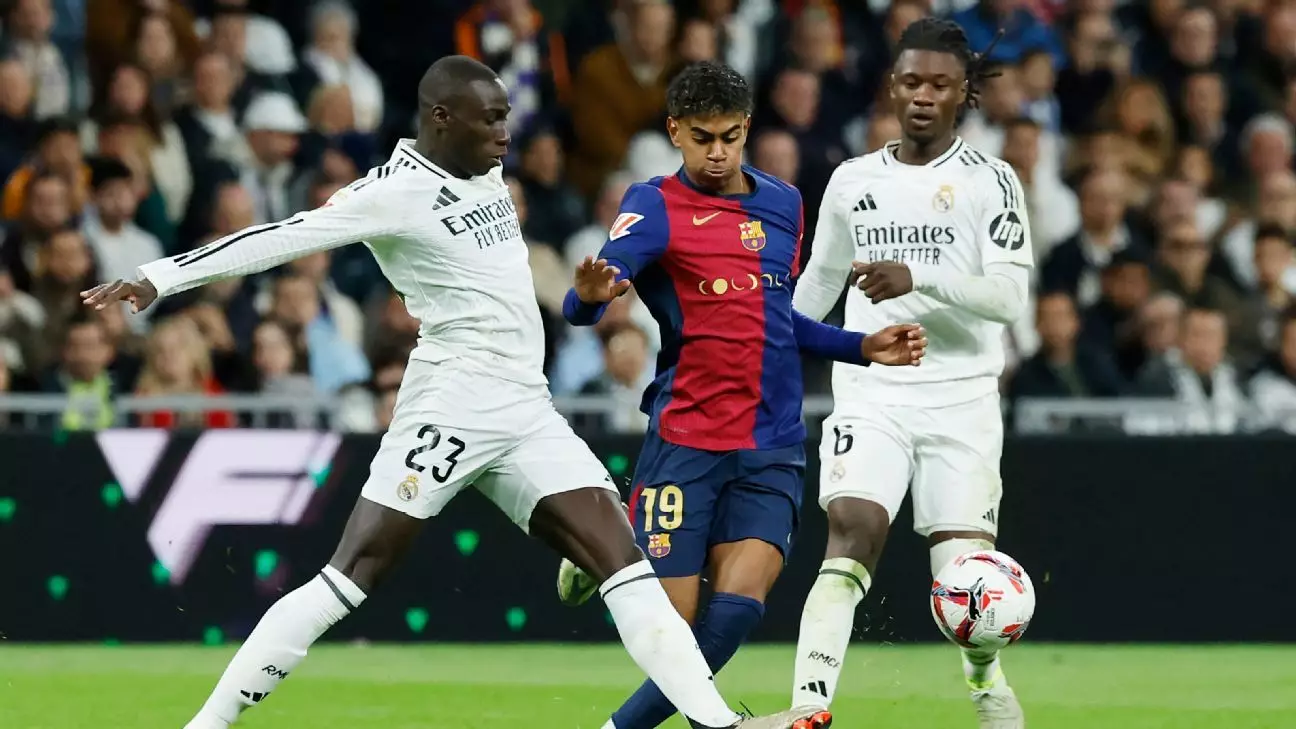The atmosphere within football stadiums can be vibrant and thrilling, yet it has also become a battleground for societal concerns, particularly the pervasive issue of racism. Recent events surrounding the Clásico between Barcelona and Real Madrid have highlighted this troubling trend, as Spanish police arrested three individuals for directing racist insults at Barcelona players Lamine Yamal and Raphinha. This occurrence, which followed Barcelona’s impressive 4-0 victory, wasn’t just a casual occurrence of crowd misconduct; it underscored a deeper malaise that has plagued football for years.
The arrests came after a complaint from LaLiga, which provided substantial evidence, including video recordings and professional analysis from a lip-reading expert, cementing the nature of the abuse. These details reveal a concerted effort by authorities to clamp down on racism within football, demonstrating a necessary but often lacking response to incidents that tarnish the sport’s image.
LaLiga’s proactive approach in addressing incidents of racism is commendable. The league’s commitment was tested recently, given the high-profile and continuous abuse faced by players like Vinícius Júnior. His experience has shone a spotlight on the need for systemic changes within the sport. Since arriving in Spain in 2018, Vinícius has been the target of racist abuse, an outcome reflective of broader societal issues that linger in the shadows of sporting arenas. The league’s decision to pursue legal action based on recorded incidents suggests a shift towards a standard where perpetrators can no longer hide amid the crowd.
This movement has begun transforming the landscape of football culture, albeit slowly. Some verdicts, such as the eight-month sentence handed to Valencia fans for racially abusing Vinícius, indicate that the legal system is starting to respond to these injustices. As LaLiga president Javier Tebas has stated, the league will continue to intensify its efforts to eradicate racism completely.
The reactions from players like Vinícius Júnior and the involved Barcelona players are pivotal. Following the Clásico, Vinícius expressed his outrage at the racist abuse. His statement, reflecting solidarity with the victims, is crucial in amplifying the conversation around racism not just in Spain but globally. It signals to both fans and authorities that such behavior is unacceptable and that sports figures will not remain silent in the face of discrimination.
Meanwhile, Lamine Yamal, as one of the youngest and most promising talents in Barcelona’s ranks, serves as a symbol of hope. His rise to prominence at 15 makes him an ambassador for change in a sport that needs progressive voices to challenge long-standing prejudices and biases. Each incident he faces serves as a reminder that the fight against racism is ongoing and that new voices must emerge to align with the existing efforts.
The issue of racism in football is not confined to any single league, team, or country; it is a global epidemic. Soccer, being the world’s most beloved sport, finds itself at a crossroads. The affluent nature of football culture often glosses over these stark realities, yet they cannot be ignored. The conversations happening around the Clásico could serve as catalysts for broader systemic change, not only within Spain but across the world.
For the sport to retain its integrity and reputation, leagues and governing bodies must recognize the urgency of the matter. Continued arrests and legal action against racist behavior are essential, but they must also be coupled with education and community engagement. Grassroots initiatives could foster respect and understanding, effectively curbing the notions of superiority that fuel discrimination.
While arrests and legal actions represent progress, complete eradication of racism from football demands a concerted effort from all stakeholders—leagues, clubs, fans, and players. As the events of the Clásico unfold, they remind us all that the beautiful game must be a platform for unity rather than division. By focusing on education, vigilance, and accountability, football can reclaim its essence as a source of pride and inclusivity. The real victory will be when players like Yamal and Raphinha can focus purely on their craft without the shadow of racism looming large over their experiences on the pitch.

